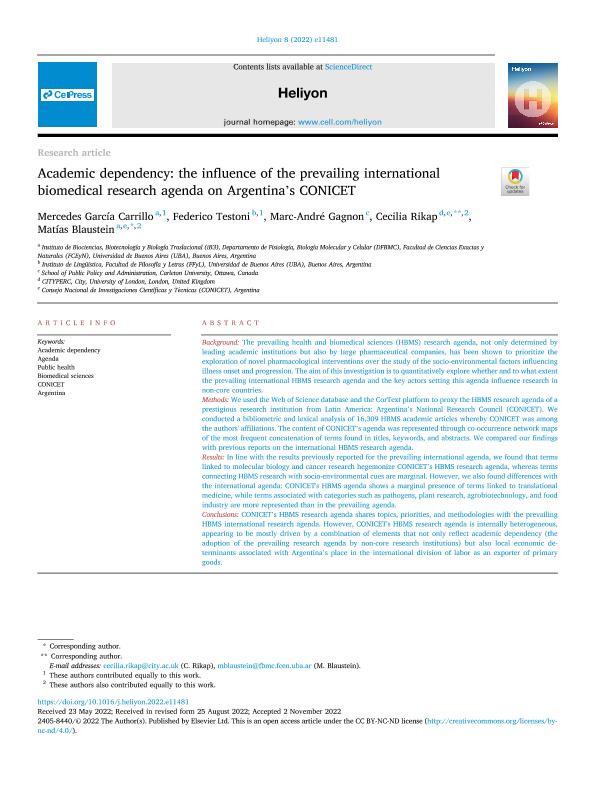Mostrar el registro sencillo del ítem
dc.contributor.author
García Carrillo, Mercedes

dc.contributor.author
Testoni, Federico E

dc.contributor.author
Marc André Gagnon
dc.contributor.author
Rikap, Cecilia Alejandra

dc.contributor.author
Blaustein Kappelmacher, Matias

dc.date.available
2023-12-27T09:58:13Z
dc.date.issued
2022-11
dc.identifier.citation
García Carrillo, Mercedes; Testoni, Federico E; Marc André Gagnon; Rikap, Cecilia Alejandra; Blaustein Kappelmacher, Matias; Academic dependency: the influence of the prevailing international biomedical research agenda on Argentina’s CONICET; Elsevier; Heliyon; 8; 11; 11-2022; 1-9
dc.identifier.issn
2405-8440
dc.identifier.uri
http://hdl.handle.net/11336/221492
dc.description.abstract
Background: The prevailing health and biomedical sciences (HBMS) research agenda, not only determined by leading academic institutions but also by large pharmaceutical companies, has been shown to prioritize the exploration of novel pharmacological interventions over the study of the socio-environmental factors influencing illness onset and progression. The aim of this investigation is to quantitatively explore whether and to what extent the prevailing international HBMS research agenda and the key actors setting this agenda influence research in non-core countries. Methods: We used the Web of Science database and the CorText platform to proxy the HBMS research agenda of a prestigious research institution from Latin America: Argentina's National Research Council (CONICET). We conducted a bibliometric and lexical analysis of 16,309 HBMS academic articles whereby CONICET was among the authors' affiliations. The content of CONICET's agenda was represented through co-occurrence network maps of the most frequent concatenation of terms found in titles, keywords, and abstracts. We compared our findings with previous reports on the international HBMS research agenda. Results: In line with the results previously reported for the prevailing international agenda, we found that terms linked to molecular biology and cancer research hegemonize CONICET's HBMS research agenda, whereas terms connecting HBMS research with socio-environmental cues are marginal. However, we also found differences with the international agenda: CONICET's HBMS agenda shows a marginal presence of terms linked to translational medicine, while terms associated with categories such as pathogens, plant research, agrobiotechnology, and food industry are more represented than in the prevailing agenda. Conclusions: CONICET's HBMS research agenda shares topics, priorities, and methodologies with the prevailing HBMS international research agenda. However, CONICET's HBMS research agenda is internally heterogeneous, appearing to be mostly driven by a combination of elements that not only reflect academic dependency (the adoption of the prevailing research agenda by non-core research institutions) but also local economic determinants associated with Argentina's place in the international division of labor as an exporter of primary goods.
dc.format
application/pdf
dc.language.iso
eng
dc.publisher
Elsevier

dc.rights
info:eu-repo/semantics/openAccess
dc.rights.uri
https://creativecommons.org/licenses/by-nc-nd/2.5/ar/
dc.subject
ACADEMIC DEPENDENCY
dc.subject
AGENDA
dc.subject
ARGENTINA
dc.subject
BIOMEDICAL SCIENCES
dc.subject
CONICET
dc.subject
PUBLIC HEALTH
dc.subject.classification
Ciencias Biomédicas Sociales

dc.subject.classification
Ciencias de la Salud

dc.subject.classification
CIENCIAS MÉDICAS Y DE LA SALUD

dc.title
Academic dependency: the influence of the prevailing international biomedical research agenda on Argentina’s CONICET
dc.type
info:eu-repo/semantics/article
dc.type
info:ar-repo/semantics/artículo
dc.type
info:eu-repo/semantics/publishedVersion
dc.date.updated
2023-12-26T11:24:11Z
dc.identifier.eissn
2405-8440
dc.journal.volume
8
dc.journal.number
11
dc.journal.pagination
1-9
dc.journal.pais
Países Bajos

dc.description.fil
Fil: García Carrillo, Mercedes. Universidad de Buenos Aires. Facultad de Ciencias Exactas y Naturales. Instituto de Biociencias, Biotecnología y Biología Traslacional.; Argentina. Consejo Nacional de Investigaciones Científicas y Técnicas. Oficina de Coordinación Administrativa Ciudad Universitaria; Argentina
dc.description.fil
Fil: Testoni, Federico E. Universidad de Buenos Aires. Facultad de Filosofía y Letras. Instituto de Lingüística; Argentina
dc.description.fil
Fil: Marc André Gagnon. Carleton University; Canadá
dc.description.fil
Fil: Rikap, Cecilia Alejandra. Consejo Nacional de Investigaciones Científicas y Técnicas; Argentina
dc.description.fil
Fil: Blaustein Kappelmacher, Matias. Consejo Nacional de Investigaciones Científicas y Técnicas. Oficina de Coordinación Administrativa Ciudad Universitaria; Argentina. Universidad de Buenos Aires. Facultad de Ciencias Exactas y Naturales. Instituto de Biociencias, Biotecnología y Biología Traslacional.; Argentina
dc.journal.title
Heliyon
dc.relation.alternativeid
info:eu-repo/semantics/altIdentifier/url/https://www.sciencedirect.com/science/article/pii/S2405844022027694
dc.relation.alternativeid
info:eu-repo/semantics/altIdentifier/doi/https://doi.org/10.1016/j.heliyon.2022.e11481
Archivos asociados
